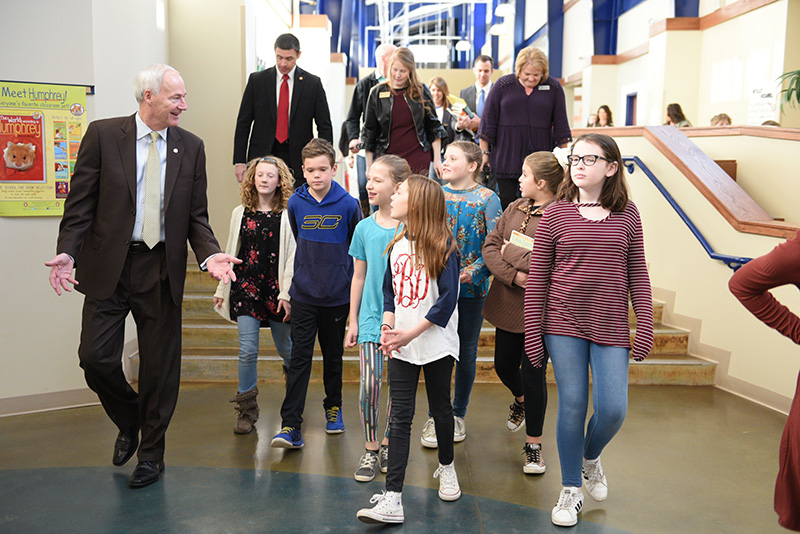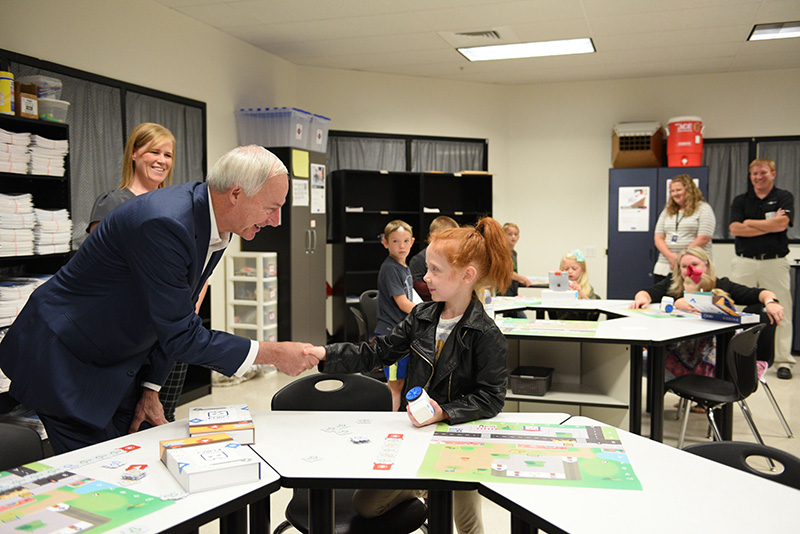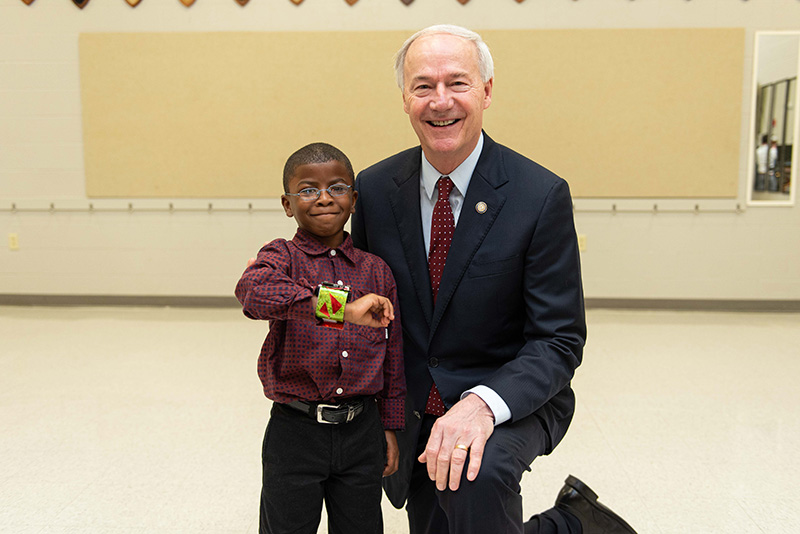Where do you go for the top news in Early Learning at the state level? Check out “5 Questions for the Governor,” where we explore the top Early Learning challenges and successes in states across the nation. We’re thrilled to partner with The Hunt Institute on this series. Read them all.
1. Since you took office, Arkansas has made significant progress in the state’s foster care system, including a reduction in the number of children in the system, and a statewide decrease in caseloads for child care workers. Why has the Arkansas foster care system been a top priority for the administration?
First Lady Susan Hutchinson and I have a strong commitment to protecting children, strengthening families and improving outcomes. We share the belief that every child in Arkansas deserves a safe and stable nurturing family every day. With four children and six grandchildren, family is an essential part of our life, and child welfare reform has been a big part of my administrative focus. The First Lady has also been very involved with the Arkansas Children’s Advocacy Centers where professionals from a variety of agencies—child protection workers, law enforcement officers, mental health providers, advocates and prosecutors—join forces to ensure child victims are receiving the essential services and referrals, as well as tracking the progress of the criminal cases.
 When I took office in 2015, the child welfare system in Arkansas was facing a troubling crisis with a steady increase of children being placed into an overloaded system with high staff turnover. With stakeholder involvement, I commissioned a broad review of the Division of Child and Family Services within the Department of Human Services. The evaluation recommendations became the driving force for improving outcomes and shaping a major child welfare reform within Arkansas to move beyond the crises.
When I took office in 2015, the child welfare system in Arkansas was facing a troubling crisis with a steady increase of children being placed into an overloaded system with high staff turnover. With stakeholder involvement, I commissioned a broad review of the Division of Child and Family Services within the Department of Human Services. The evaluation recommendations became the driving force for improving outcomes and shaping a major child welfare reform within Arkansas to move beyond the crises.
For the past six years I have supported the efforts to improve outcomes for children and families by directing a focus on main areas: strengthening families, improving foster care for those who need it, and strengthening the workforce.
I am proud of the efforts we have and the improvements within the system. On October 1, 2019, Arkansas became one of the first states to implement the Family First Prevention Services Act (Family First) growing our service array for families whose children remain in the home. In September 2020, Arkansas joined the National Partnership for Child Safety as we aim to improve the quality of internal child fatality and near fatality reviews by implementing safety science to help foster worker safety and assist in gathering quality information from the review process. This will allow Arkansas the opportunity to share data with other jurisdictions and collaborate to develop strategies to improve safety and prevent child maltreatment-related fatalities.
Lastly, during the 2021 legislative session, the Arkansas legislature with my support passed several bills to advance child welfare in our state. First, a bill to create the Blue Ribbon Task Force to End Child Abuse. This task force will include a multidisciplinary membership with the purpose of developing a systematic and holistic approach to eliminate child abuse in the state. Addressing primary and secondary prevention efforts, and improving prevention networks and partnerships. Secondly, a CAC bill that will provide added training opportunities for local multidisciplinary teams, improved stakeholder communication and greater oversight by the legislature. Both pieces of legislation will help ensure we increase areas of accountability among all agencies that are responsible for the care and well-being of our most vulnerable children.
2. From the funds Arkansas is receiving from the American Rescue Plan Act, describe some activities Arkansas is planning to improve early childhood education.
Early childhood education in Arkansas continues to benefit from the federal stimulus funds. In 2020, Arkansas received $160 million from the Coronavirus Response and Relief Supplemental Appropriations (CRRSA) Act which allowed us to supplement child care vouchers, reimburse providers for deep cleaning, provide essential worker child care assistance and deliver provider maintenance payments quarterly beginning in February 2021 until the relief funding is exhausted. Provider maintenance funding is based on licensed capacity of child care centers and their Better Beginnings quality level, a system designed to improve the level of quality in child care and early childhood education programs across the state. Better Beginnings distinguishes the quality of each Arkansas childcare facility by a 1-, 2- and 3-star rating system.
Arkansas will now receive $464 million from the American Rescue Plan (ARP), $178M for essential worker families and $286 million for child care stabilization.The $178 million from the American Rescue Plan Act will only be used for essential workers through September 30, 2024.
Arkansas has identified 7, 934 essential worker families in our state that we will be able to assist through 2024, providing free child care to eligible families. Currently DHS is serving 11,378 children from 7405 eligible families in the regular Child Care Development Funds with no waiting lists. The ARP funds will allow us to add additional eligible families without regard to income.
The $286 million for child care stabilization will allow Arkansas the opportunity to invest in stabilizing and supporting excellence in child care and early childhood education. By funding Teacher Education and Compensation Helps (T.E.A.C.H.), Arkansas will provide access to higher education for early childhood educationteachers, directors and family child care providers working with young children.
The T.E.A.C.H. program was developed to upgrade the level of education of teachers working with young children while making the educational process affordable, increasing wages and reducing turnover. This investment will impact the Arkansas workforce by creating a real-time child care search for families that will allow providers to update their actual availability and also support multiple programs that connect families with child care resources, and promote preschool programs.
Arkansas has identified common expectations for what children typically know,understand and are able to do at different ages.These standards are designed to assist in developing age-appropriate learning goals for children, to support developmentally appropriate curriculum and assessment, and to outline a progression of development and learning that supports success in school and in life.
Arkansas will use ARP funds to continue to provide families resources for the Birth through 60 Months program, as well as the Arkansas Better Chance (ABC) programs and the ABC Early Childhood Ready for Learning teams that work to assist preschool readiness.
3. RISE Arkansas, the Reading Initiative for Student Excellence, has set the goal to increase the number of students in grades 3-8 who meet the reading readiness benchmark by 10 percent. How do you see early childhood education complementing this initiative?
The Reading Initiative for Student Excellence (RISE) continues to be a huge success in our state as it encourages a culture of reading by coordinating a statewide reading campaign with community partners, parents and teachers to establish the importance of reading in homes, schools and communities. The Division of Elementary and Secondary Education (DESE) is in the process of developing rules to support public school districts and open-enrollment public charter schools that are required to include a literacy plan in the annual school improvement plan. Promoting early childhood learning readiness through literacy is a top priority in Arkansas.
Since 2017, Arkansas has trained 200 specialists to be K-2 RISE trainers and 240 specialists to be grades 3-6 RISE trainers. In the course of four years, we have trained almost 19,000 teachers and still continue to expand our efforts. When the COVID-19 pandemic sent teachers home in the spring of 2020, Arkansas successfully pivoted and began offering stand-alone education days to students, which could be offered virtually. We also partnered with our state network of Public Broadcasting Service (PBS), operated by the Arkansas Educational Television Network (AETN) and broadcasted early elementary-intermediate elementary curriculum via ArkansasPBS. These efforts were available through a statewide broadcast, which we used CARES act funds to strengthen, or online through a website which is also used by teachers across the state. In addition, the Arkansas Department of Education continues to train teachers in RISE through the Arkansas PBS Science of Reading series, an online way for teachers to achieve phase one of a proficiency pathway.
 In October 1, 2019, the Arkansas Division of Elementary and Secondary Education (DESE) was awarded a federal Comprehensive Literacy State Development (CLSD) grant from the US Department of Education. Identified as the Successful Outcomes for Arkansas Readers (SOAR), 95 percent will be sub-granted to school districts with at least 15 percent of the grant funds serving children from birth through kindergarten and 40 percent serving students in kindergarten through grade 5. The evidence-based Science of Reading will be implemented through the RISE curriculum.
In October 1, 2019, the Arkansas Division of Elementary and Secondary Education (DESE) was awarded a federal Comprehensive Literacy State Development (CLSD) grant from the US Department of Education. Identified as the Successful Outcomes for Arkansas Readers (SOAR), 95 percent will be sub-granted to school districts with at least 15 percent of the grant funds serving children from birth through kindergarten and 40 percent serving students in kindergarten through grade 5. The evidence-based Science of Reading will be implemented through the RISE curriculum.
Our Pre-K RISE initiative will launch in July 2021, through DESE, and will increase the focus of early childhood education by providing high-quality literacy curriculum and professional development for early childhood educators. When we focus on increasing teachers’ instructional knowledge and skill development for early literacy instruction, we instill learning pathways for our young children. Through Pre-K RISE, we have the opportunity to provide equitable access across the state to developmentally appropriate early childhood instruction grounded in the science of reading. Providing research-based instruction in early childhood programs will prepare children to be successful in kindergarten and ultimately impact 3rd-grade reading success and beyond.
4. Your leadership on computer science education has garnered national recognition for your state from many sources: from the White House to tech companies. How do initiatives like this help to promote a holistic understanding of education in Arkansas?
Each governor, as he or she comes into office, brings priorities that they want to emphasize within the limited time they have. Being on the precipice of the 4th technological revolution, I saw a real opportunity to effect meaningful and long-lasting change in Arkansas early in my 2014 gubernatorial campaign.
Arkansas’s Computer Science and Computing Initiative, which in 2015 became a focus of my administration and remains a top priority of education and economic work within our state agencies, has redefined what Arkansas students—kindergarten through college—are expected to be taught, learn and experience throughout their education. Our K-8 embedded computer science and computing standards and our recently redesigned high school computer science and computing courses and pathways, include traditional areas of computer science such as programming, networking, computer engineering and cyber security, but also address emerging and high-growth fields such as artificial intelligence, machine learning, data science, mobile application development and game development and design.
And beyond K-12, Arkansas’s postsecondary institutions are growing their opportunities and options for both traditional four- year university degrees and two-year collegiate programs and certifications.
We envision computer science impacting early childhood education by the K-8 computer science and computing standards. Working backward from kindergarten expectations, we see ways that early childhood education and preschool learning can help disseminate advanced computer science skills.
Young children are being introduced to technology earlier each year. From computerized games and toys, early childhood education promotes creative play, organization of patterns, sequencing and solving problems.
When our administration began looking into what we could do in the computer science and computing area, we worked closely with Code.org to identify and establish key potential areas on which to concentrate, and took decisive and swift action toward implementation. Arkansas went about this work in developing the computer science and computing skills of our population with the understanding that it would be the generation’s necessary response to economically surviving and thriving in the coming changes in technology.
The Arkansas Computer Science and Computing Initiative sought to be the preemptive solution to these impending technological changes, much like the National Defense Education Act of 1958 was that generation’s response to the launch of Sputnik, or how “A Nation at Risk” of 1983 ushered in a whole new era of educational reform. We realized if we did not expand our educational pursuits as a state to include computer science and computing skills in a meaningful manner, our students would not be prepared to fill the pipeline of jobs opening in their future, which would have dire consequences for the economy and well-being of Arkansans.
 Since 2015, the purposeful actions of my office and the state regarding computer science and computing have always intended to propel and keep Arkansas students and its populace on the forefront of using and understanding technology in productive ways that provide lucrative career opportunities for themselves, their families and their neighbors, and continue to push the economy of Arkansas, as its citizens transverse through the fourth and fifth industrial/ technological revolutions.
Since 2015, the purposeful actions of my office and the state regarding computer science and computing have always intended to propel and keep Arkansas students and its populace on the forefront of using and understanding technology in productive ways that provide lucrative career opportunities for themselves, their families and their neighbors, and continue to push the economy of Arkansas, as its citizens transverse through the fourth and fifth industrial/ technological revolutions.
The ultimate focus of the Arkansas Computer Science and Computing Initiative is to drive Arkansans’ understanding of how computers, computer systems and applications work independently and in conjunction. To expand students’ abilities/knowledge base to be able to utilize technology effectively as per its design, and to push technology beyond its original design to create new knowledge, understanding and applicability.
5. Why do you think Arkansas has garnered this attention? Do you think it is warranted, and how should the work of the Arkansas Computer Science and Computing Initiative be looked at by other states in the nation as they grow their initiatives?
What really kicked off the success of this initiative in Arkansas was the bipartisan support for Act 187 of 2015, the first legislation of its kind that was passed and actually implemented. This law requires all high schools to offer at least one computer science course to every student, and established the first Computer Science Task Force.
Because of its importance, we did not wait multiple years to roll the high school requirement in, but instead allowed the requirement to be in place in the fall of 2015. The task force work also began almost immediately, identifying the needs of the state and working closely with the newly employed Arkansas State Director of Computer Science, a first of its kind position nationally, to create and refine the state strategic plan for the initiative.
Through the dedication of multiple agencies and the support of the Arkansas legislators, we have seen tremendous growth of the initiative. This growth includes:
- increasing the number of high-school-certified teachers from under 50 in 2015 to over 550 currently, providing some level of computer science andcomputing training to over half of the 33,000 licensed Arkansas educators;
- increasing student enrollment in high school courses, growing from around 1100 in 2014-15 to over 10,500 in 2020-2021; and
- closing the racial gap in high school computer science enrollment to the point where racial enrollment in high school computer science is now on parity with general population
In late 2019, I authorized the creation of the second task force, the Arkansas Computer Science and Cyber Security Task Force, which was charged with reviewing the work of the state thus far and to make recommendations for the future. In our 2021 legislative session, Act 414 was passed into law through bipartisan support, which requires students to take a computer science course to graduate, taken as early as 8th grade. In addition, each high school must employ a computer-science-certified teacher by the 2023-2024 school year.
While Arkansas is making purposeful decisions in this space, there are other states that are making great strides in both Computer Science and Cyber Security. As the upcoming chair of the National Governors Association, I will focus on showcasing Computer Science as my chair’s initiative. I am eager to highlight the work done in Arkansas, as well as other states across the nation. As we look for ways to support early childhood education in all areas, I remain committed to advocate for building problem solving and creative thinking skills in our young future leaders.
All photographs were taken pre-pandemic.



